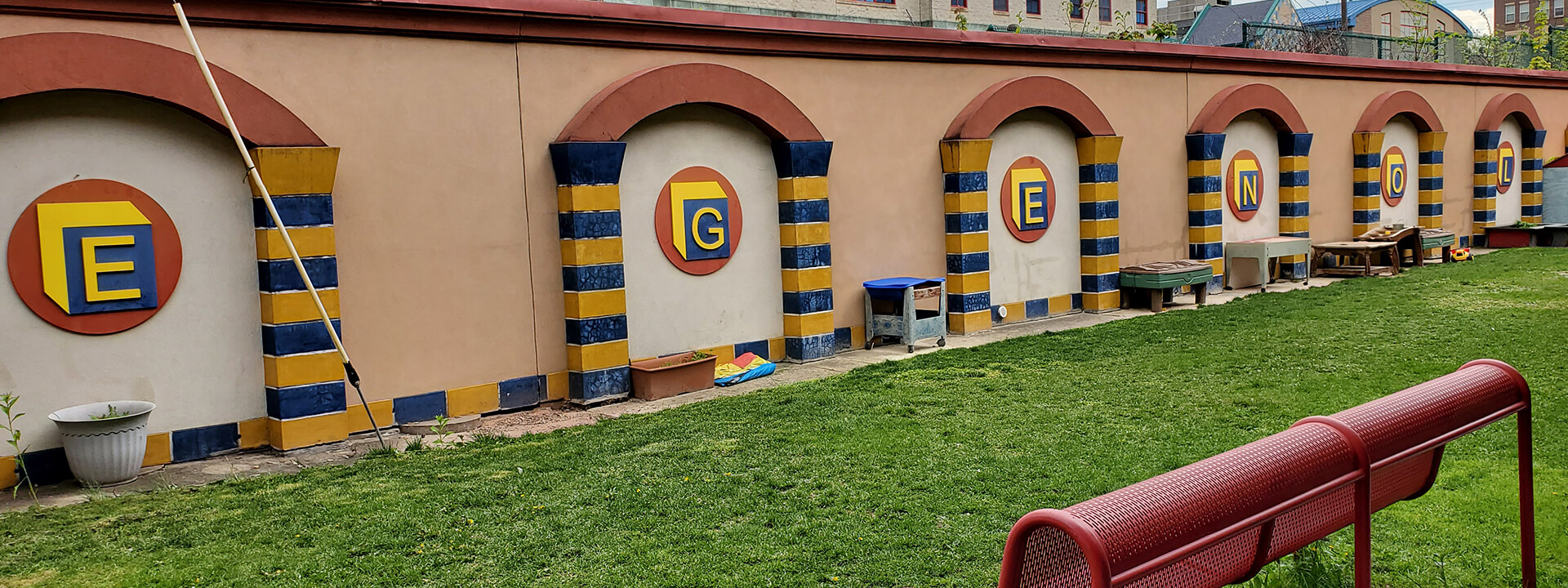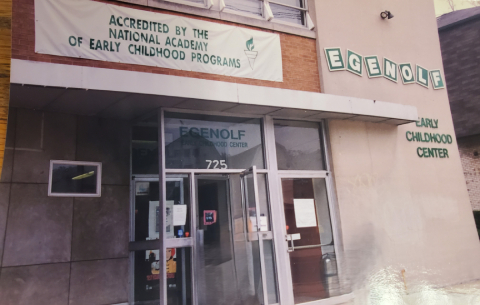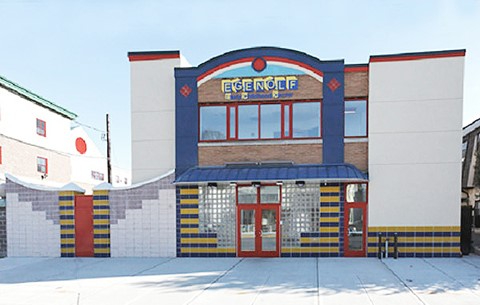On Dec. 4, 1890, the Elizabeth Day Nursery Association was founded by prominent women concerned about the welfare of children whose mothers were forced to work. It began in a small house at 306 Spring Street with a matron employed to do the work. It was difficult to arouse interest in a new venture, and mothers were skeptical about the nursery's benefits for their children.
The mothers who participated in the service soon determined that their children were happy and they received good care and proper nutrition. The children participated in educational activities and received medical attention. The fee for services was five cents per day.
Word about the services spread rapidly, and participation grew. Before the end of the first year, the nursery had to move to a larger location at 800 Pearl Street, where it occupied the second floor. These services for the first year cost $554.75, or eleven cents per child. The cost of care was supported by in-kind donations and subscriptions of $2 per year, which entitled the subscriber to vote in all decisions.
Former Egenolf facility and Current Egenolf facility
Celebrating 135 years of delivering high quality early care and education in Elizabeth. From Spring Street in 1890 to Elizabeth Avenue in 1900 to our current location at 725 Newark Avenue in 1973. We love our current state of the art updated and expanded facility completed in 2006! We are so proud to celebrate our generations of graduates for whom we laid the foundation for success in life!
On July 18, 1893, an annex was opened at 81 Court Street but was closed within one year. Services expanded on Pearl Street to the extent that children were provided overnight care to accommodate work schedules or illnesses. Those children, who lost their parents to illnesses, took up residence at the nursery. Participation increased exponentially, and a larger facility was desperately needed. The nursery expanded to include the adjoining house at 802 Pearl Street in July 1896. From 1896 to 1897, the nursery showed a profit of three cents!
In March 1900, the Elizabeth Day Nursery was incorporated, and all money and property belonging to the original association were transferred to the corporation. The board of managers recognized the need for space more suitable for early care and education but was pressed for resources to purchase this kind of space.
On October 30, 1903, Lena and Peter Egenolf donated their house at 1140 Elizabeth Avenue to the corporation, which honored the family by changing the name to the Egenolf Day Nursery Association. The mission stated in 1916 was to "aid and strengthen children both physically and mentally and help them to become intelligent and upright citizens of our country."
Children of all ages were accepted into the program, but it soon became evident that preschool-aged children presented the greatest demand, and the focus of services was devoted to children ages 3 to 6. To deliver the services, fundraising became necessary. The association held "pound parties," where each person gained entry to the tea by donating a pound of rice, sugar, or other provisions. Pencil sales netted a profit of $1,206 in 1921, which cleared all outstanding debts.
By 1951, the nursery served 75 children from 7 a.m. until 6 p.m. for $1.60 per day. Included in the fee were: Breakfast, lunch, medical and dental care, and a Mother's Club, which provided parenting information. The staff consisted of a director, a secretary, five teachers, a cook, and a janitor. Additional financial support was received from the Community Chest and other fraternal organizations, a grant from the City of Elizabeth, and many endowments.
In 1957, the nursery was granted 501(c)3 designation as a charitable organization exempt from federal income tax.
In 1973, the Egenolf Day Nursery Board of Managers negotiated the purchase of the former National Cash Register building at 725 Newark Avenue. The $230,000 purchase was made possible by selling the former site at $75,000, liquidating a stock portfolio, and acquiring a mortgage. The $105,000 renovations were financed through donations from corporations and personal gifts.
The nursery operation was financed through a grant under Title IV-A of the Social Security Act allocated through the United Way, income from a trust set up by the Egenolf family, and parent fees determined on a sliding fee scale. The nursery was affiliated with the New Jersey Association for the Education of Young Children; the Child Welfare League of America; Elementary, Kindergarten, and Nursery Educators; and the United Way of Eastern Union County. The purpose of the nursery was redefined as "to provide young children with both education and care in a living-learning environment designed to meet the needs of growing minds and bodies."
The nursery's advocacy began with participation in a demonstration in Trenton on March 8, 1973, and in Washington, D.C., on March 14, 1973, demanding reconsideration for daycare needs under Title IV-A since proposed federal reductions in funding were being considered.
In 1983, the nursery changed its name to the Egenolf Early Childhood Center Association, which was more illustrative of its mission. New Jersey licensed the center to serve 117 children from 2 1/2 to 6 years of age. In 1989, Egenolf Early Childhood Center began participating in the Child Care Block Grant Program, which yielded 81 subsidized slots for families meeting eligibility requirements.
Recognizing the need for quality staff serving this age group, the center allocated funds for its classroom staff to earn a Child Development Associate (CDA) Credential through the Council for Professional Recognition in 1987. Focus was shifted to preparing children for kindergarten success in a safe, caring environment. To that end, the center pursued accreditation through the National Association for the Education of Young Children. In 1995, Egenolf Early Childhood Center became the first in the City of Elizabeth to be honored with the nationally accredited early childhood program designation.
In the late 1990s, brain research revolutionized the importance of early education. It became evident to the board of directors that for the program to continue in its pursuit to present the highest quality programming to the children under its care, and the facility needed significant upgrades. The board voted to embark on a capital expansion/renovation program. The construction phase was completed without interruption to services. Once the expansion was completed, the entire program was shifted to the new addition while the existing building was renovated. The $3.2 million project was completed in 2006, and the state-of-the-art facility was featured in an international architectural magazine for design excellence.
During that time, the landmark "Abbott v. Burke" New Jersey Supreme Court decision mandated the delivery of state-funded preschool education in New Jersey. Under the decision, Elizabeth was identified as a district that must provide free preschool to its 3- and four-year-old residents. Egenolf Early Childhood Center began collaborating with the Elizabeth School District in 1999. Teachers received state scholarships for bachelor's degrees and preschool through third-grade certification. Family workers were funded to provide intensive support to families. A research-based curriculum was executed, and health services were provided for every child. The program featured ten classrooms serving 15 children, each with a certified teacher with a college degree and an assistant with a Child Development Associate credential.
In 2011, California sent a delegation from the Governor's Education Committee to visit the Egenolf Early Childhood Center program to create the same model under a new proposed funding plan. Based upon classroom assessments conducted by the National Institute for Early Education Research, Egenolf Early Childhood Center was the "Top Performing Preschool" in the district. The center has been featured in several books, journals, and television programs focused on high-quality early childhood education.
In 2015, on the occasion of its 125th anniversary, Egenolf Early Childhood Center was proud to reflect on its long history of commitment to children and families and to uphold its mission "Egenolf Early Childhood Center exists for promoting a joy of learning in young children that will support success in school and life."






